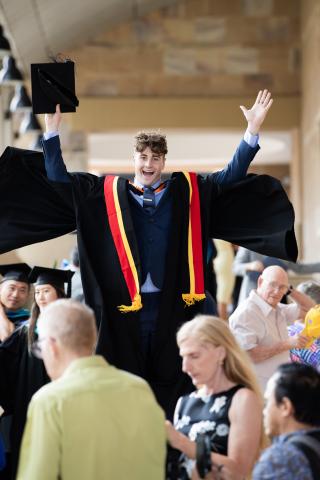High school wasn’t overly enjoyable for Tobias Street.
And university? Well, it wasn’t really on the cards.
The Bundaberg local thought perhaps he’d just get a job in town as a tradie after finishing school.

But that all changed when he chose an elective subject in Year 11 that ignited a passion within.
Human-Centred Design is a relatively new subject offered in schools.
It revolves around developing useful products, services, environments, or organisations, and learning from the people for which the solution is being designed.
“The subjects’ assessments basically consisted of going out, finding a stakeholder and interviewing them about a particular problem and then designing a product service or environment to combat that problem,” Mr Street said.
When he was accepted into Bond University on an Indigenous Scholarship, there was one degree that stood out.
“I thought choosing the degree was going to be the hardest bit just because there were so many options,” Mr Street said.
But the Bachelor of Entrepreneurial Transformation was calling his name as it shared several similarities with his favourite elective back in high school.
“I thoroughly enjoyed the Human-Centred Design subject in high school and the Entrepreneurial Transformation Degree sounded almost exactly the same.
“I knew that’s where my interest laid, as well as my passions.”
Mr Street began his degree at Bond in 2021 and, as a talented swimmer, balanced his time in the classroom and the pool as a member of Bond’s Elite Sport Program.
As a proud Darumbal man, swimming is truly in Mr Street’s blood.
“A cool fact that I've learnt in the last couple of years was that (the Darumbal people) were one of the very few tribes that swam,” he said.
While studying full time on top of his hectic swimming schedule wasn’t easy, Tobias had a three-pronged support network consisting of the Elite Sport Program, the Nyombil Indigenous Support Centre and the Transformation CoLab.
“Bond was extremely accommodating, especially the Elite Sport Program,” he said.
“It allowed me to drop a subject per semester to three, and I think if I had to do four subjects per semester, I wouldn't have made it through.
“The Transformation CoLab was also instrumental for me. Everyone from the staff to fellow students were so welcoming and easy to get along with and if I ever needed help or a mentor, they were quick to provide support.”
Bond University’s Transformation CoLab is a program made up of six innovative degrees and majors designed to holistically prepare students for success in their future careers.
For Mr Street, the Entrepreneurial Transformation Degree, part of the Transformation CoLab program, provided him with a clear pathway to his long-term goal of one day running his own business in human-centred design.
“I enjoy helping someone overcome a challenge, whether that be providing them with a product design, service, or environment, so I definitely think a business down that sort of track is where I would like to head.”
But for now, the transdisciplinary nature of his degree has allowed Mr Street to land a Graduate Advisor role with the Australian Communications and Media Authority (ACMA) in Melbourne.
Graduate Advisors like Mr Street have three rotations in their first year to explore the various sections within ACMA.
The first rotation is chosen by the ACMA HR team, based on each graduate’s degree and skill set, then graduates choose their remaining two rotations.
For Mr Street’s first rotation, he is working within a new ACMA service known as BetStop - the National Self Exclusion Register, a free Australian Government initiative to block yourself from all licensed Australian online and phone gambling providers.
“I mostly deal with compliance in this role, making sure all the wagering companies are both staying in line and satisfying all the elements,” he said.
“I can see why they placed me in this rotation first.
“It's a very new service that started in August last year and the Entrepreneurial Transformation Degree is all about adapting to change in a business setting, overcoming challenges and making changes according to those challenges.”
Mr Street said the role aligns perfectly with his passions - helping people overcome problems in their life.
“It's had a large impact and I feel honoured to be in a in a team, taking care of running project service,” he said.
“We had a little presentation last month and someone who was attending that presentation, one of their spouses is on the register, and it's helped them quite a lot.
“It’s rewarding to see the impact in real life.”
Tobias’ story highlights how a Bond University scholarship can change lives and career paths.
Next Wednesday, 15th May, the Bond community will have a chance to support future Indigenous scholarship recipients during Bond's Giving Day fundraising challenge.
Giving Day is an opportunity to support the 25 scholarships the university offers, ranging from academic to leadership, sport and Indigenous heritage.
To learn more, visit here: https://www.charidy.com/bonduniversityutm_source=imodules&utm_medium=web&utm_campaign=landingpage

